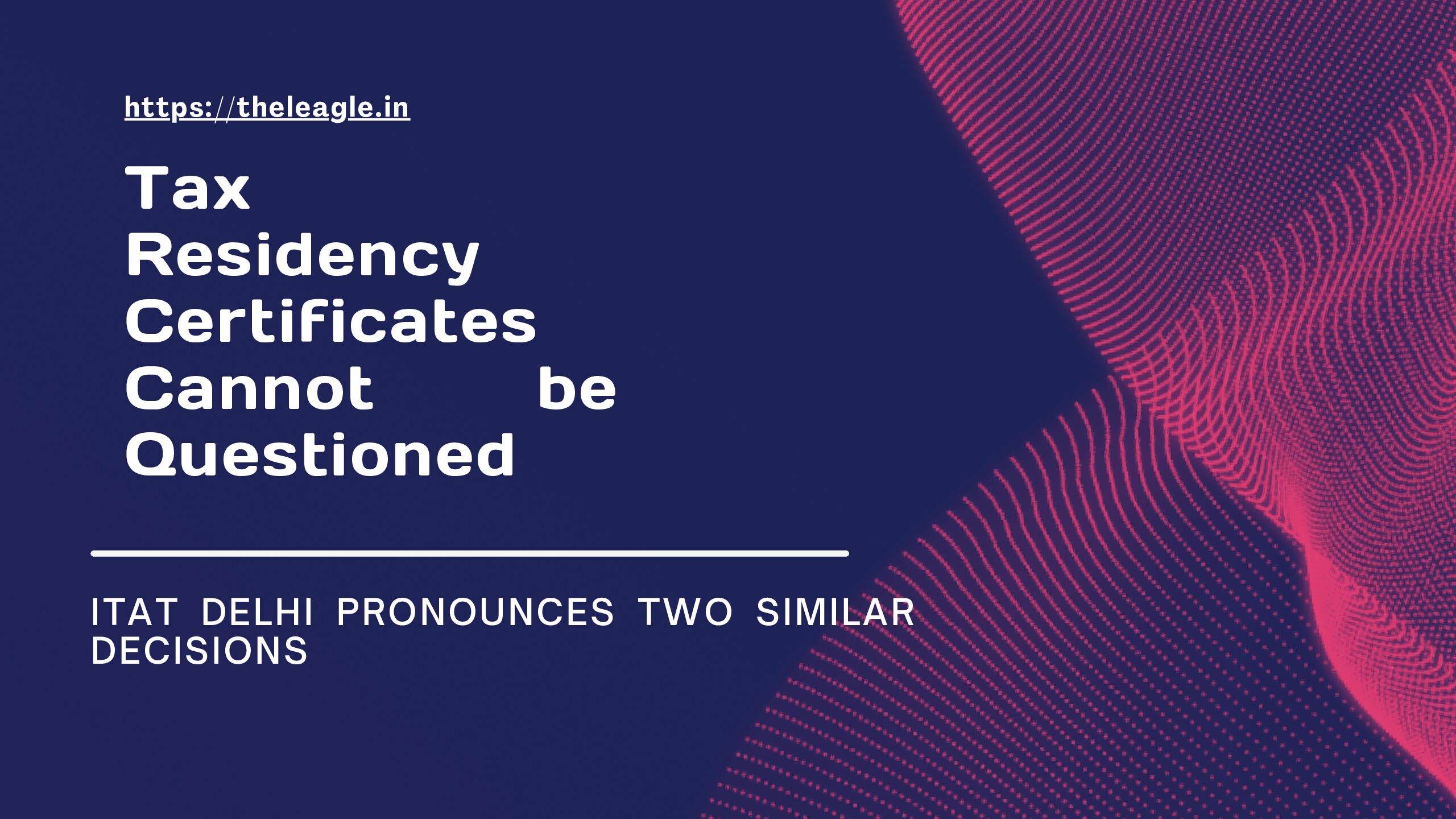The Income Tax Appellate Tribunal (‘ITAT’), New Delhi pronounced two decisions on 10 and 11 August 2023 and in both of them it reiterated one of the core observations of Supreme Court in the Azadi Bachao Andolancase[1], i.e., Indian Revenue officials cannot go beyond behind the Tax Residency Certificate (‘TRC’) issued by competent authorities of another jurisdiction. Further, the ITAT held that mere allegations of tax evasion and use of conduit companies are not sufficient to deny an assessee benefits under the Double Taxation Avoidance Agreement (‘DTAA’) unless the allegations are backed by cogent evidence.
Introduction
In the Sarva Capital case[2], the issue before the ITAT was taxability or otherwise of capital gains from sale of equity shares under Article 13(4) of the Indo-Mauritius DTAA. The assessee was a non-resident corporate entity incorporated under the laws of Mauritius and a tax resident of Mauritius. During its business, assessee purchased equity shares in Indian companies and in the assessment year in question sold those equity shares and made capital gains. The assessee offered the income from sale of equity shares as capital gains but claimed exemption under Article 13(4) of the Indo-Mauritius DTAA.
In the Sarva Capital case, the Assessing Officer denied assessee benefits under DTAA by stating various reasons which inter alia included that tax residency certificate issued by Mauritius is not sufficient to establish its residency if the substance proves otherwise. Additionally, the Assessing Officer argued that the assessee was not the beneficial owner of the income, it was just a conduit and had no commercial rationale for incorporation in Mauritius to argue that the substance proves that the assessee was incorporated in Mauritius only as part of a tax avoidance arrangement and thus was not entitled to benefits under the DTAA.
In a similar set of facts, in the Leapfrog Financial case[3], the ITAT had to adjudicate if the assessee was entitled to benefit of Indo-Mauritius DTAA for income from capital gains derived from sale of shares. The assessee was a non-resident corporate entity incorporated under the laws of Mauritius and a tax resident of Mauritius. The assessee sold certain unlisted shares of a company and claimed that the resultant long-term and short-term capital gains were exempt from taxation under Article 13(4) of the Indo-Mauritius DTAA.
And just like in the Sarva Capital case, in the Leapfrog Financial case too, the Assessing Officer denied the assessee benefit of tax exemption under the Indo-Mauritius DTAA by claiming that the assessee had been interposed as an entity only for the purpose of deriving benefits under Indo-Mauritius DTAA and for tax avoidance purposes. The Assessing Officer applied the doctrine of form over substance to deny assessee tax benefits under the DTAA and proceeded to tax it under domestic law.
Against decision of the Assessing Officer in each of the cases, the assessees approached the ITAT Delhi which overruled the Assessing Officers in both cases to decide in favor of the assessees.
Tax Evasion Allegations and Tax Residency Certificate
In the Sarva Capital case, while deciding the residency status of the assessee, the ITAT relied on the Azadi Bachao case and the recent decision of the Delhi High Court in Blackstone Capital case[4] to reiterate that tax authorities in India cannot go behind the tax residency certificate issue by competent tax authorities of other jurisdictions and that the tax residency certificate is sufficient to claim not only legal and residential ownership but also treaty benefits. The ITAT concluded that the Assessing Officer committed a ‘fundamental error’ in denying DTAA benefits to the assessee despite the fact that the assessee possessed a valid tax residency certificate. (para 15)
In the Leapfrog Financial case, the ITAT made similar observations and stated that Indian tax authorities cannot go beyond the tax residency certificate issued by another jurisdiction. It cited observations of the Supreme Court in the Azadi Bachao Andolan case to conclude that Revenue authorities cannot question the assessee’s residential status and entitlement to treaty benefits. (para 16) In this case, the ITAT specifically questioned the Assessing Officer’s allegations that the assessee was a conduit company and noted that despite making such allegations there is nothing on record to show the Assessing Officer invoked provisions under Chapter XA, i.e., GAAR provisions of the IT Act, 1961. The ITAT concluded:
Thus, in our view, the reasonings of the Assessing Officer to treat the assessee as a shell/conduit company to deny the benefits under India Mauritius tax treaty is without any substance as they are not backed by any credible evidence. (para 13)
Conclusion
The above discussed ITAT Delhi decisions reiterate a fundamental aspect of international tax jurisprudence that was unequivocally laid down by the Supreme Court in the Azadi Bachao Andolan case, i.e., Indian tax authorities cannot question the veracity and authenticity of the tax residency certificate issued by competent authorities of other jurisdictions. While there is little to find fault with the ITAT decisions on this point, the fact that Assessing Officers can and continue to ignore the ratio of Azadi Bachao Andolan case in their attempt to deny DTAA benefits to assessees is not a great example of efficient and rigorous tax governance. And, as the ITAT rightly pointed out in the Leapfrog Financial case, if there is merit of allegations of tax avoidance by the assessee, then the Assessing Officer should not hesitate to apply GAAR provisions. Else, allegations of tax avoidance and that the Mauritian company of the assessee is used as a conduit for investments are merely empty rhetoric and not specific allegations backed by concrete evidence.
[1] Union of India v Azadi Bachao Andolan (2004) 10 SCC 1.
[2] Sarva Capital LLC v ACIT ITA No. 2289/Del/2022.
[3] Leapfrog Financial Inclusion India (II) Ltd v ACIT ITA Nos. 365 & 3666/Del/2023.
[4] Blackstone Capital Partners (Singapore) VI FDI Three Pte Ltd v ACIT 2023/DHC/000634.
